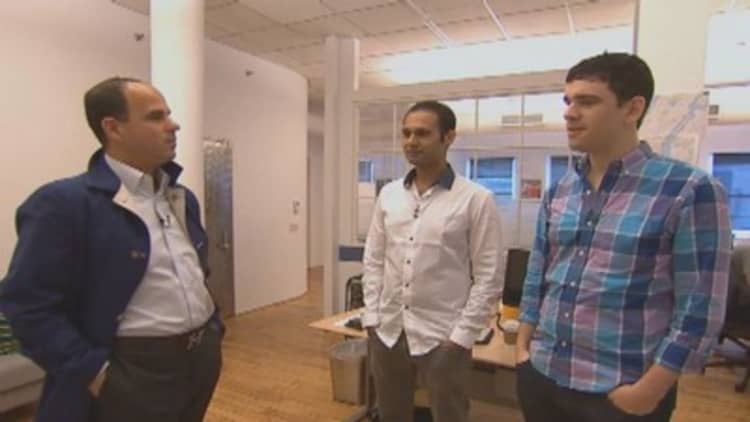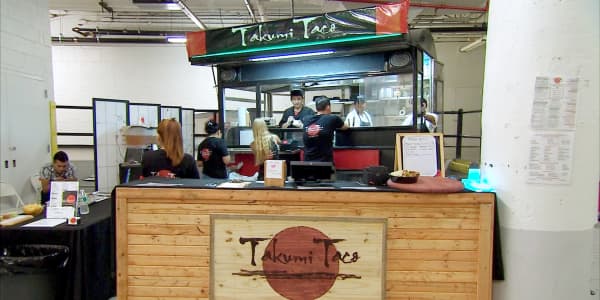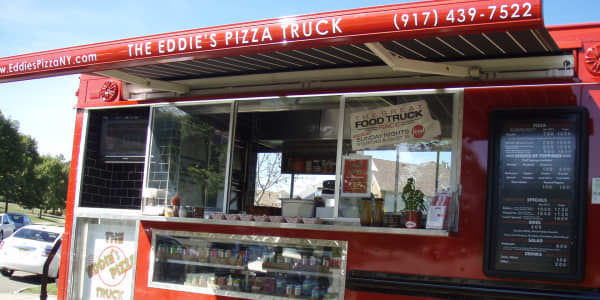

Around the water cooler, at a wedding or during a cocktail event, disposable plastic cups often are the go-to holder for a person's liquid of choice. But ever wonder what happens to all those synthetic polymers after the party ends? A new invention called Loliware hopes to stop them from beating up Mother Earth.
"Every year, half a billion disposable cups enter the landfill that will never biodegrade," said Chelsea Briganti.
She and co-founder Leigh Ann Tucker want to revolutionize the use of plastics with their creation—a fully biodegradable and edible material they're selling as a cup—called Loliware. Their goal is to create a full set of tableware.
"The longer you dry it out, the harder it becomes." Briganti said "We really look at Loliware as a material that can become anything. Even packaging."
Read More Is it the end of food trucks? Not quite, says Lemonis
Trained industrial designers, Briganti and Tucker spent more than three years developing Loliware's recipe. It's vegan, all natural and made from six ingredients. The main component, agar, is a gelatin derived from seaweed.
The cups can hold a drink for more than 24 hours and have a shelf-life of three months. They're fully biodegradable if composted after use or eaten.
Despite Loliware's many great selling points, getting consumers to bite on a never-before-seen product isn't easy. Today on "The Biz Fix," Tucker and Briganti meet with Marcus Lemonis of CNBC's "The Profit" to get advice on how to best launch their product.
Market to wide appeal
When a company's pushing something that's foreign and new, it should clearly define the product and market it with the most compelling aspect it can to grab the largest consumer appeal.
Lemonis enjoyed tasting the cups, which he likened to a fruit roll-up, but suggests touting them mainly as biodegradable and focusing less on their edibility.
Read More Lemonis: When selling Crumbs isn't enough, diversify!
"So the point that you make about being able to eat it isn't that it's a snack, it's that it's so good that you can eat it," Lemonis said.
Eating a cup could be viewed as a party trick that not everyone wants to ingest. The fact that Loliware doesn't harm the earth if composted—unlike plastic—is expected to be what customers will really buy. More people will buy biodegradable than edible, Lemonis said.
Start simple then grow
Loliware plans to start by selling a citrus cup and then roll out many more flavors. But Lemonis suggests it first introduce a nonflavored cup to consumers. The company could build a following with the simplest, basic form of the material and then test new flavors on that customer base, he said.
"I'm a brand-new company; I'm trying to enter the market," Lemonis said. "And so I want to produce where I think the biggest strike zone is going to be.
Read MoreStarting out? How to land big clients
"You got to start with something that's superbasic, get a base, get a platform, get acceptance and then you're going to grow off of that."
Make a quality first impression
A consumer's first impression can make or break a new product. Loliware is so foreign to people that the packaging should include details about the cup-making process, according to Lemonis. It should show how they become biodegradable and safe to eat, including the quality control standards, he said.
"I would almost have a very brief description on the back, of the process, explaining what it is, showing it like a lab," he said. "Because I would think it was rubber."
Read MoreProfit from your business before they do
It's a tough education, but once the women crack the code, it's lights out, Lemonis said. He told them they're wildly close to going to market, but doesn't think they're quite ready yet.
"You have to, unfortunately, be your own biggest critic. And that's the way the product gets better."
Briganti and Tucker chose to revolutionize the cup; such a commonly used product that the start-up has greatly impressed Lemonis. He's looking forward watching Loliware grow in the future.





